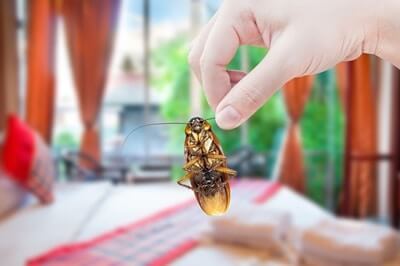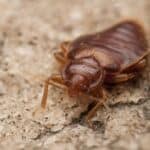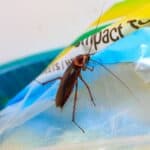When cockroach populations grow, they can get into unlikely places, including bedrooms. All cockroaches need is food, water, and shelter, which a bedroom can provide in certain circumstances.
Cockroaches may live in your bedroom if there are crumbs or stains from spilled drinks. They can even eat dead skin cells or hair. If there are mostly empty coffee mugs or water on your bedside table, these are a good source of hydration. Cockroaches can sneak in through cracks or gaps in your walls, windows, flooring, and ceiling.
Cockroaches can hide in drawers, wardrobes, bedsheets, clothing, and underneath beds. Although bedrooms aren’t cockroaches’ first choice, they’ll make do. As their population expands and resources dwindle, some cockroaches will seek out new territory wherever it can be found.
What Attracts Roaches To Your Bedroom?
Cockroaches rarely infest bedrooms, but that’s normally due to a lack of interest. They prefer to live wherever food and water can be found in abundance. This is usually in the kitchen or bathroom, but your sleeping area may suffice.
If you find cockroaches in the bedroom, it’s for the following reasons:
- Overpopulation: If space and resources become limited, cockroaches may resort to in-fighting and cannibalism. This will lead to smaller cockroaches seeking out new territory, such as your bedroom.
- Fleeing: If you’ve set up baits and sprayed insecticides around your kitchen, some cockroaches will flee to safer areas. This may include your bedroom closet, under your bed, or in your wardrobe.
- Desperatation: If your kitchen and bathroom are well-maintained, cockroaches may struggle to find any food or water. A bedroom that is rarely tidied will be be a viable alternative.
- Entering via an access point. Cockroaches may enter from the outdoors. If your bedroom window has a gap, or there’s a hole along the baseboards, cockroaches may congregate there before moving to other areas.
Of course, there’s nothing about bedrooms that will specifically drive off cockroaches.
Cockroaches will be attracted to your bedroom due to:
Good Nesting Conditions
Cockroaches like to hide and nest in dark, humid, and undisturbed spaces.
You’re less likely to spend many active hours in bedrooms. This provides cockroaches with the quiet that they need to forage, move around, and rest safely. During the night, you’ll normally be asleep. Cockroaches may crawl over you while you’re sleeping.
Bedrooms are usually kept dark at night (and occasionally during the day, if you’re at work or school). Unlike other parts of the home, which might have lighting from appliances, most people keep their bedrooms blacked out. These nighttime insects will love that.
Your bedroom may be adjacent to a bathroom, allowing in steam from hot showers.
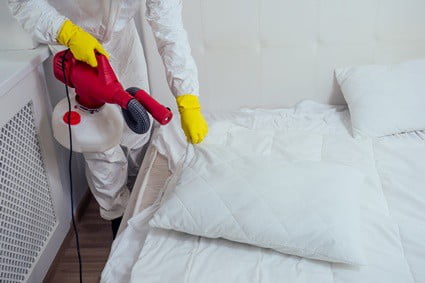
Unkempt Room
Leaving your bedroom unkempt is often what attracts cockroaches and other bugs.
The clutter in your room provides ample space for cockroaches to hide and lay their eggs. You may even find egg sacks (ootheca) in your wardrobe or corners of the closet.
Any boxes, storage containers, clothing, and items on your bedroom floor are ideal hiding places.
Dead Skin And Hair
According to Imperial College London, people shed dead skin cells and hair daily.
Since cockroaches are omnivorous scavengers, they’ll eat anything that comes their way. This includes dandruff, skin flakes, and loose hair. Bedrooms will contain these substances, especially on your bedding or in a laundry basket.
Food Crumbs
If you eat snacks in your room, you’re likely to drop crumbs on the floor or leave snack wrappers undisposed. To sustain themselves, cockroaches will eat leftover food, including the trace amounts found on wrappers.
Why Do I Have Roaches In My Clean Bedroom?
If your room is kept immaculate, along with the rest of your home, it may seem baffling that you now have cockroaches. However, they have many ways of gaining access to a bedroom, even if there are no lures.
The reasons for cockroaches in your bedroom may be:
- Gaps along your windows or walls, letting cockroaches in from the outside.
- Crevices or cracks in your flooring, allowing cockroaches to crawl up from the foundations.
- Cockroaches next door that are entering your home via a shared wall with a neighbor.
- Boxes or moving gear stored in the bedroom that contained cockroaches.
- Thrift-store clothing that was infested with cockroaches and now sits in your closet.
According to Animal Behaviour, the availability of water is more important to cockroaches than food. While cockroaches can survive for a month without food, they can only survive for a week without water.
So, cockroaches may enter your bedroom en route to your bathroom. Many unsuspecting people leave a glass of water on their bedside table at night, giving cockroaches a way to hydrate.
What Causes Cockroaches In Bedroom?
Any of the following could be the cause of cockroaches in the bedroom:
- Is your bedroom humid?
- Is there any paper or cardboard that cockroaches can eat?
- Did you recently bring new clothing, furniture, or boxes into your room?
- Have you been eating meals in your bedroom?
- Do leftover plates, glasses, or mugs stay in your bedroom once you’ve finished with them?
- Are there any food stains or marks on the carpet?
- Are there gaps around your windows or sills?
- Are there gaps where your walls meet your ceiling or flooring?
- Does a neighbor have a cockroach infestation?
- Is there a flower box attached to your bedroom window or plants growing up against the side?
- Is there pet food or an aquarium (fish tank) in your bedroom, providing food and water?
- Do you have a pet door that allows them to come in and out?
If you live in an apartment, discuss the situation with your property manager or landlord.
How Do Cockroaches Get In Your Bedroom?
You may think that the gap under the door or the crevice along your baseboard is too small.
Cockroaches are agile enough to fit through holes less than half their size. Because their exoskeletons have some flexibility, cockroaches only need to splay out their legs or flatten their bodies.
According to the Journal of Experimental Biology, cockroaches use their antennae as sensors to detect obstacles. This enables them to negotiate their path when climbing different structures into your home (and, by extension, your bedroom). This also makes cracks in your ceiling or gaps around your ceiling fan viable access points.
Cockroaches use these antennae to smell food from far away. So, they can detect a snack wrapper you left under your bed, even if you can’t. Crumbs or stains from a spilled drink can lure cockroaches into your bedroom.
Found Baby Roaches In My Bedroom
Seeing cockroach nymphs in your bedroom is a bad sign. It means the cockroaches have established a nest and are breeding. Within a short amount of time, the cockroach population can grow exponentially.
You don’t even need a male. A female is capable of reproducing on her own. Even without a mate, female cockroaches can produce other females (not males) asexually. This is known as parthenogenesis. Once a male cockroach becomes available, cockroaches will reproduce sexually.
Depending on the species, a female cockroach will produce ootheca (egg sacks) that contain up to 50 eggs. Within 3-4 months, this next generation of cockroaches will reach breeding age and continue the reproduction process.
Do Baby Cockroaches Look Like Bed Bugs?
People often mistake cockroach nymphs for bedbugs in their early development stages.
After hatching, baby cockroaches and bed bugs are white in color. This is because they’ve yet to develop an exoskeleton. Soon after, they’ll turn red or brown, making them look like bed bugs.
The easiest way to tell bed bugs and cockroaches apart is their antennae. If the antennae are the same length as the body, you’re likely to be dealing with cockroaches. Also, the eyes of bed bugs tend to protrude.
Found A Cockroach On My Bed
Cockroaches may scurry around your bedroom, but they don’t usually go onto the bed. That’s because:
- It’s elevated off the ground
- You spend more time in or on your bed
- Beds are open and exposed
When other parts of the home are overpopulated, they’ll need to find new hiding spots. If they’re beginning to starve, your bed will be full of skin flakes, hair, and sweat residue.
Cockroaches can scale up flat services, as long as they aren’t completely sheer. Glass repels cockroaches, but certain kinds of metal and wood won’t. Cockroaches will climb bedposts if they need food, water, or warmth.
Where Do Cockroaches Hide In A Bedroom?
In bedrooms, the most common hiding spots for cockroaches will be:
- Inside closets
- Underneath dressers
- Under beds
- In wall molding, especially those with cracks or gaps
- Around ceiling fan outlets
- Inside wall outlets
- In the back of drawers
- Underneath clothes piles
- Inside or underneath appliances, like AC units or gaming systems
- Dark cabinets
Will Keeping Lights On Keep Roaches Away From My Bedroom?
According to the Department of Biology, cockroaches are most active at night. They prefer to avoid light to avoid detection and stay hidden from predators.
However, cockroaches can overcome any light-related concerns once they verify that the area is safe. This will only take a few nights at most. They’ll soon realize that your bedside lamp being on doesn’t equate to danger because the occupants of the room are asleep.
So, keeping the lights on throughout the night doesn’t mean that cockroaches will stay out of the bedroom.
How To Get Rid Of Cockroaches In Bedroom
Cockroaches are resilient pests. If you have a full-blown infestation, you may need to contact pest control. Fumigating a bedroom on your own can be extremely dangerous.
However, there are ways to tackle a small infestation. Here’s how:
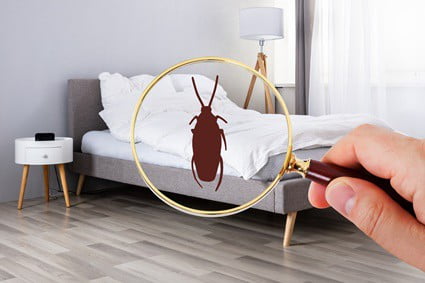
Diatomaceous Earth
Diatomaceous earth is a naturally occurring powder that’s safe for humans. However, it’s deadly for all insects with an exoskeleton, including cockroaches. Its coarse texture damages the exoskeleton, resulting in dehydration.
Sprinkling diatomaceous earth in places where cockroaches frequent will reduce their numbers.
Boric Acid
Boric acid is among the most effective home remedies for killing cockroaches and other common household pests. It contains potent compounds that damage the cockroach’s exoskeleton.
To make it more enticing, you can mix boric acid with flour, sugar, peanut butter, or egg yolks. Once consumed, it’ll be taken back to the nest, killing off other colony members.
Silicone Tape Around Bed Posts
Most cockroach species are capable of climbing walls and flat surfaces. To keep them out of your bed, wrap silicone tape around the bedposts. This will prevent them from gaining traction. However, they still climb walls and ceilings.
Peppermint, Cypress, and Citrus Oil
Cockroaches find peppermint, citrus, and cypress to be naturally distasteful.
You can mix essential oils with water to dilute them and fill a spray bottle. Spritz this near doors, windows, and any items you want to keep cockroaches away from.
It may stain fabrics, so only spray it around your closets and not bedding, carpets, or clothing.
No Snacking in The Bedroom
Cockroaches will endure the harshest conditions if they have access to food and water.
Limit snacking and drinking to another room to limit how many spills or crumbs can accumulate in your bedroom. You should vacuum regularly to clean up leftovers and dead skin flakes.
Although cockroaches don’t prefer bedrooms, they may be able to find enough food and water to survive. However, many people mistake bed bugs for cockroaches. So, check that you’re dealing with the right pest.
